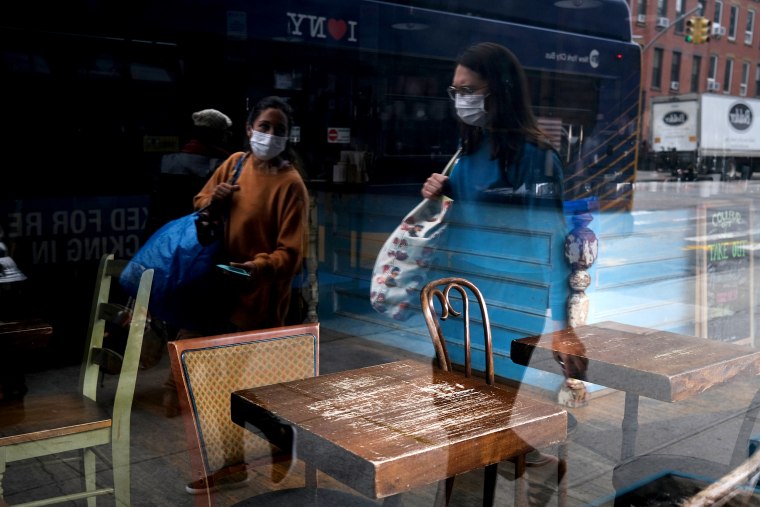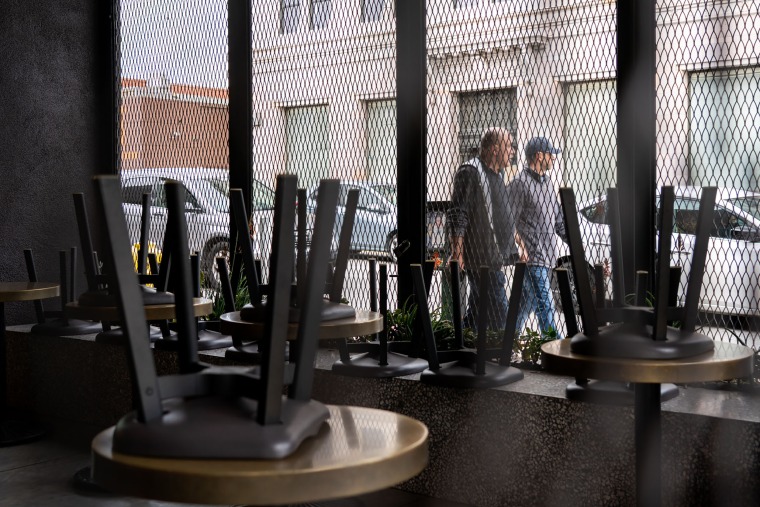“Lupita’s taquería or Juana’s quinceañera shop didn’t get money, while Ruth’s Chris (Steakhouse) and major hotel chains are getting millions of dollars.”

Women are reflected in the window of a closed business in New York on April 23, 2020.Spencer Platt / Getty Images
April 24, 2020, By Suzanne Gamboa
A survey of more than 500 Latino small-business owners who applied for coronavirus relief loans found that just 97 of them received money while the rest have never heard back on their applications.
The League of United Latin American Citizens and the U.S. Hispanic Chamber of Commerce conducted the survey that was sent to members of both organizations and that solicited responses publicly.
The organizations weeded out responses from people who were not Latino small-business owners. Of 871 responses received Friday morning, 546 were Latino small-business owners.
“The survey only confirms what we already know, that the Paycheck Protection Program money went to Wall Street billionaires and very little of it trickled to the mom-and-pop shops and small businesses of America,” LULAC National President Domingo García said. “Lupita’s taqueria or Juana’s quinceañera shop didn’t get money while Ruth’s Chris (Steakhouse) and major hotel chains are getting millions of dollars.”
April 24, 2020, By Suzanne Gamboa
A survey of more than 500 Latino small-business owners who applied for coronavirus relief loans found that just 97 of them received money while the rest have never heard back on their applications.
The League of United Latin American Citizens and the U.S. Hispanic Chamber of Commerce conducted the survey that was sent to members of both organizations and that solicited responses publicly.
The organizations weeded out responses from people who were not Latino small-business owners. Of 871 responses received Friday morning, 546 were Latino small-business owners.
“The survey only confirms what we already know, that the Paycheck Protection Program money went to Wall Street billionaires and very little of it trickled to the mom-and-pop shops and small businesses of America,” LULAC National President Domingo García said. “Lupita’s taqueria or Juana’s quinceañera shop didn’t get money while Ruth’s Chris (Steakhouse) and major hotel chains are getting millions of dollars.”
Related Coronavirus package falls short for lenders to Latino, minority businesses
The Ruth's Chris chain announced Thursday it is returning its $20 million small-business loan from the program after heavy backlash.
The survey asked whether the owners applied for and whether they got a loan from the $349 billion Paycheck Protection Program created by Congress to provide forgivable loans to small businesses so they could pay and continue to employ their workers during the coronavirus crisis.
The program ran out of money in 13 days, leaving many small businesses standing in line with pending applications or cut off from applying.
The majority of the Latino business owners who applied for the loans did so through their existing bank or lender, the survey found. Major banks where Latinos applied included Bank of America, JPMorgan Chase, Wells Fargo, Frost Bank and PNC.
None of the 31 who applied to Wells Fargo were approved. NBC News has reached out to Wells Fargo for comment.
"It was HORRIBLE!" a business owner said in the survey. "I have been with Wells Fargo my whole business life, 30 years and they did nothing to help me! I felt like I have been used!"
Wells Fargo said in a statement is "working as quickly as possible" to prepare applications from small business customers for the latest round of funding Congress provided. The bank said it has mobilized thousands of employees and launched new technology to get their applications processed.
There were 198 respondents who said that they did not apply for loans. These included people who said they tried and gave up, frustrated by a cumbersome process, or said they didn’t know about the loans or how to go about getting them, said Juan Proaño, co-founder and CEO of Plus Three, a technology company that analyzed the survey data.
The Ruth's Chris chain announced Thursday it is returning its $20 million small-business loan from the program after heavy backlash.
The survey asked whether the owners applied for and whether they got a loan from the $349 billion Paycheck Protection Program created by Congress to provide forgivable loans to small businesses so they could pay and continue to employ their workers during the coronavirus crisis.
The program ran out of money in 13 days, leaving many small businesses standing in line with pending applications or cut off from applying.
The majority of the Latino business owners who applied for the loans did so through their existing bank or lender, the survey found. Major banks where Latinos applied included Bank of America, JPMorgan Chase, Wells Fargo, Frost Bank and PNC.
None of the 31 who applied to Wells Fargo were approved. NBC News has reached out to Wells Fargo for comment.
"It was HORRIBLE!" a business owner said in the survey. "I have been with Wells Fargo my whole business life, 30 years and they did nothing to help me! I felt like I have been used!"
Wells Fargo said in a statement is "working as quickly as possible" to prepare applications from small business customers for the latest round of funding Congress provided. The bank said it has mobilized thousands of employees and launched new technology to get their applications processed.
There were 198 respondents who said that they did not apply for loans. These included people who said they tried and gave up, frustrated by a cumbersome process, or said they didn’t know about the loans or how to go about getting them, said Juan Proaño, co-founder and CEO of Plus Three, a technology company that analyzed the survey data.
Proaño was among the first to apply for a loan at Bank of America, but faced trouble getting an application before the bank changed some eligibility criteria. Also, emails regarding the loan were sent to his company by a third party they didn't recognize and ended up in a spam folder. His application is pending, he said.
Frost Bank, based in the majority Latino city of San Antonio, approved the greatest share of the loans and the highest number with 60 percent or 6 of 10 approved, the survey found.
It was followed by PNC Bank, which approved 14 percent or 1 of 7 applications; JPMorgan Chase, 12 percent or 5 of 42; and Bank of America, 11 percent or 5 of 44 applications.
Some of the banks added in their own restrictions to government criteria for the loans, including requiring applicants to have an existing loan or a line of credit with the bank to apply.
“Latinos have historically been redlined and denied loans to start and maintain businesses since the early 1900s and we are seeing that tradition today,” Garcia said.
The survey data release comes the day after Congress approved a second small-business relief package of $484 billion, which has been criticized by community lenders who provide loans to Latino and other minority and women small-business owners and for “distressed” and rural area. The lenders said the bill set aside too little money for such “underserved” proprietors.
Experts have said that Latino wealth and income, which had just been rebuilt to where it was before the Great Recession, could be decimated by the economic fallout of the coronavirus crisis.
LULAC and other Latino organizations had pressed Congress to set aside $50 billion for minority businesses in the small-business relief package that the House approved Thursday. LULAC is a civil rights organization founded in 1929 to combat discrimination, including economic racism.
“They failed again,” Garcia said. “It’s a pay-to-play scheme to deny Latino businesses the same opportunities that others have.”
NBC Latino

Suzanne Gamboa is a national reporter for NBC Latino and NBCNews.co
© 2020 NBC UNIVERSAL
It is imperative that states take the lead to ensure no one is left out of the recovery.

People walk past a closed restaurant in Los Angeles on March 20, 2020.
Qian Weizhong / Xinhua News Agency/Getty Images file IRONIC
April 21, 2020, By Sonja Diaz and Paul Ong
Coronavirus has torn through communities at unprecedented rates, stretching health care systems to their breaking points and bringing the economy to a standstill. It’s been said that the coronavirus is a great equalizer, but we now know from what little racial and ethnic data that exists, communities of color are disproportionately hurting.
It’s been said that coronavirus is a great equalizer, but we now know from what little racial and ethnic data that exists, communities of color are disproportionately hurting.
Our most vulnerable neighborhoods are falling through the cracks. And as stimulus money starts to hit bank accounts across the country, we need to focus on the many people in America who will not be getting any help as quarantine drags on. In the absence of additional federal leadership and funding, it's up to states and cities to step in and protect those most at risk from health and economic catastrophe.
California and Los Angeles County provide a case study underscoring why a one-size-fits-all approach simply will not work.

The big airlines got greedy — now they want a bailout MARCH 23, 2020 04:11
In March, the Economic Policy Institute estimated that California will lose over 1.6 million jobs by this summer, close to a quarter of which will be in the leisure, hospitality and retail sectors. Nowhere will this be more acutely felt than Los Angeles County where fashion, food and tourism are staples of our economy. And a recent report released by the UCLA Latino Policy and Politics Initiative, the UCLA Center for Neighborhood Knowledge, and Ong & Associates finds this could affect Latino and Asian neighborhoods the most, leaving families scrambling for solutions without the means to pay rent or put food on the table. These communities are also the ones that will likely not receive a fair share from emergency financial relief programs.
While many people have been able to socially distance while continuing to work, our research suggests that Latino and Asian workers disproportionately rely on low-wage jobs in industries where the most layoffs in the wake of COVID-19 are occurring. They are also more likely to be employed in low-wage blue-collar manufacturing jobs that have been shut down. These workers are grandparents, parents and children who live on the brink of poverty on the best of days. Now with the loss of their jobs, they are facing an uncertain future.
In Los Angeles County, our research finds that approximately 30 percent of Latino majority neighborhoods and 20 percent of Asian majority neighborhoods will face economic uncertainty versus just 3 percent of white majority neighborhoods due to the impact of COVID-19 on the service and retail sectors.
There was hope that the federal government would step up to meet the needs of these uncertain times. But the CARES Act stimulus packages don't go far enough.
Right now, to qualify for CARES unemployment benefits, you must not only work enough hours at a single place of employment but have earned enough wages to rise above the minimum threshold put in place by the state. If you’ve been unemployed for an extended period, however, and only recently secured a new job, you may not be eligible. Further, many service workers, including fast-food workers or hotel cleaners, are part time and often hold more than one job to make ends meet. If one of those jobs is deemed an essential service, many states will reduce benefits based on the wages an individual continues to earn.
April 21, 2020, By Sonja Diaz and Paul Ong
Coronavirus has torn through communities at unprecedented rates, stretching health care systems to their breaking points and bringing the economy to a standstill. It’s been said that the coronavirus is a great equalizer, but we now know from what little racial and ethnic data that exists, communities of color are disproportionately hurting.
It’s been said that coronavirus is a great equalizer, but we now know from what little racial and ethnic data that exists, communities of color are disproportionately hurting.
Our most vulnerable neighborhoods are falling through the cracks. And as stimulus money starts to hit bank accounts across the country, we need to focus on the many people in America who will not be getting any help as quarantine drags on. In the absence of additional federal leadership and funding, it's up to states and cities to step in and protect those most at risk from health and economic catastrophe.
California and Los Angeles County provide a case study underscoring why a one-size-fits-all approach simply will not work.

The big airlines got greedy — now they want a bailout MARCH 23, 2020 04:11
In March, the Economic Policy Institute estimated that California will lose over 1.6 million jobs by this summer, close to a quarter of which will be in the leisure, hospitality and retail sectors. Nowhere will this be more acutely felt than Los Angeles County where fashion, food and tourism are staples of our economy. And a recent report released by the UCLA Latino Policy and Politics Initiative, the UCLA Center for Neighborhood Knowledge, and Ong & Associates finds this could affect Latino and Asian neighborhoods the most, leaving families scrambling for solutions without the means to pay rent or put food on the table. These communities are also the ones that will likely not receive a fair share from emergency financial relief programs.
While many people have been able to socially distance while continuing to work, our research suggests that Latino and Asian workers disproportionately rely on low-wage jobs in industries where the most layoffs in the wake of COVID-19 are occurring. They are also more likely to be employed in low-wage blue-collar manufacturing jobs that have been shut down. These workers are grandparents, parents and children who live on the brink of poverty on the best of days. Now with the loss of their jobs, they are facing an uncertain future.
In Los Angeles County, our research finds that approximately 30 percent of Latino majority neighborhoods and 20 percent of Asian majority neighborhoods will face economic uncertainty versus just 3 percent of white majority neighborhoods due to the impact of COVID-19 on the service and retail sectors.
There was hope that the federal government would step up to meet the needs of these uncertain times. But the CARES Act stimulus packages don't go far enough.
Right now, to qualify for CARES unemployment benefits, you must not only work enough hours at a single place of employment but have earned enough wages to rise above the minimum threshold put in place by the state. If you’ve been unemployed for an extended period, however, and only recently secured a new job, you may not be eligible. Further, many service workers, including fast-food workers or hotel cleaners, are part time and often hold more than one job to make ends meet. If one of those jobs is deemed an essential service, many states will reduce benefits based on the wages an individual continues to earn.
Related
Coronavirus unemployment numbers are staggering. And the real number is higher.
Los Angeles County’s neighborhoods also demonstrate the widespread financial pain that entire communities will face by excluding undocumented immigrants from relief. Even with California Gov. Gavin Newsom’s plan to extend relief to undocumented immigrants, the coverage and benefit levels are capped at $1,000 per household, with only enough money in the fund for about 150,000 people in a state where the undocumented population is over 2 million. And across the nation, an estimated 11.3 million undocumented immigrants could face the same predicament.
Ignoring these glaring deficiencies is not only inhumane in the midst of a crisis but shortsighted. As the two youngest and fastest-growing populations in the nation, Latinos and Asians will help determine how and when we rebound from this pandemic.
Exclusion of residents from economic recovery efforts is being driven by both lack of knowledge about the magnitude of the burdens these neighborhoods bear as well as racialized politics that have demonized far too many residents and painted them as unworthy of assistance. Either way, we have a humanitarian crisis that must be addressed.
It is imperative that states take the lead to ensure no one is left out of the recovery. This requires recovery programs focused on those who are at highest risk of not receiving federal COVID-19 relief. Further, states should create a wage replacement program for those ineligible for unemployment insurance. States must also impose accountability measures, such as collecting and analyzing data for demographic groups and neighborhoods to ensure COVID-19 relief is actually reaching those most in need.
No one is exempt from this deadly virus, but those with the least resources will carry the heaviest burden if we fail to act. Our nation, states and local communities have a stake in resolving this crisis, and our moral compass and ability to thrive in the future depends upon our leaders making the right choices now.
Sonja Diaz is founding director of the UCLA Latino Policy and Politics Initiative.
Paul Ong is director of Ong & Associates, a public-interest socioeconomic consulting firm, and is trained as an urban planner and economist.
Paul Ong is director of Ong & Associates, a public-interest socioeconomic consulting firm, and is trained as an urban planner and economist.
No comments:
Post a Comment